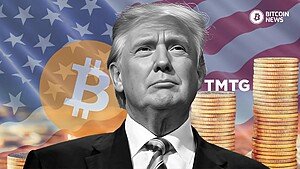Brazil is making headlines in the global financial world with a groundbreaking proposal: the creation of a Strategic Bitcoin Reserve.
Congressman Eros Biondini recently introduced a bill in Brazil’s Chamber of Deputies, suggesting that up to 5% of the country’s international reserves should be allocated to bitcoin.
This initiative, if approved, could position Brazil as a leader in the digital economy and pave the way for broader bitcoin adoption across Latin America.
The proposed reserve, called RESBit (Reserva Estratégica Soberana de Bitcoins), is designed to diversify Brazil’s national assets while safeguarding its economy from geopolitical risks and currency fluctuations.
Congressman Biondini emphasized the strategic importance of this move, stating:
“The creation of RESBit is a strategic measure that positions Brazil as a leader in the new digital economy, reducing economic risks and expanding opportunities for technological and financial development.”
Brazil currently holds no bitcoin in its reserves, unlike Venezuela, which owns 240 BTC.
If the bill passes, the government could gradually purchase up to $3 billion worth of bitcoin, equivalent to 5% of its international reserves. This measured approach aims to strengthen Brazil’s financial infrastructure without exposing the economy to unnecessary risks.
Brazil’s move is inspired by other nations already integrating bitcoin into their financial systems.
El Salvador famously adopted Bitcoin as legal tender in 2021, and Bhutan recently incorporated bitcoin into its sovereign wealth fund.
Related: El Salvador’s 2024 Bitcoin Holdings | An Overview
United States is also considering a similar strategy, with President-elect Donald Trump advocating for a Strategic Bitcoin Reserve and pro-Bitcoin legislators like Senator Cynthia Lummis proposing the purchase of 1 million BTC over five years.
By joining this trend, Brazil could not only boost its economy but also solidify its position as a forward-thinking nation. Biondini remarked, “This proposal aims to secure Brazil’s economic future” while aligning it with global innovation trends.
In a similar action, Pennsylvania representatives Mike Cabell and Aaron Kaufer recently proposed a bill enabling the state treasurer to invest in bitcoin, which analysts see as a sign of a global shift toward adopting bitcoin in reserves.
Many believe that Brazil is unlikely to be the last nation heading in this direction. Dennis Porter, CEO of Satoshi Action Fund (SAF), highlighted the sheer volume of similar proposals, stating:
“I am about to speak to a body of international lawmakers about ‘Strategic Bitcoin Reserves’. There is more interest in Bitcoin than ever before. An orange tidal wave of Bitcoin bills are coming for the entire planet.”
The SAF is promoting a Strategic Bitcoin Reserve model legislation aimed at enabling state governments to hold bitcoin as part of their financial reserves.
This initiative seeks to modernize state treasury management, and its success hinges on gaining widespread grassroots support to influence adoption.
One unique aspect of the proposed bitcoin reserve is its potential connection to Brazil’s digital currency, the Real Digital (Drex).
The bill suggests that bitcoin reserves could support Drex’s development and integration into both public and private sectors. To ensure transparency, the Central Bank of Brazil and the Ministry of Finance would oversee the reserve, employing secure technologies like cold wallets for storage.
The proposal also includes measures to maintain accountability, such as biannual public reports and strict adherence to Brazil’s Financial Responsibility Law. A technical advisory committee composed of cybersecurity experts would be formed to guide the reserve’s management.
Beyond financial benefits, the bitcoin reserve could encourage technological advancement and public education.
The bill calls for initiatives to promote blockchain technology and Bitcoin knowledge among Brazilians. By fostering a tech-savvy environment, Brazil could attract global investors and position itself as a leader in financial innovation.
Legislators in Brazil’s Chamber of Deputies are expected to debate the bill in the coming weeks.
If approved, Brazil would join a growing list of countries embracing bitcoin at the national level. However, the initiative faces challenges, including concerns about volatility and potential political resistance.
Analysts believe this bold move could inspire other Latin American countries to consider similar strategies. With bitcoin Exchange-Traded Funds (ETFs) already popular in Brazil, this proposal might mark a significant step toward mainstream Bitcoin adoption in the region.
Biondini’s plan reflects a forward-thinking approach to economic stability and innovation.
By investing in bitcoin now, Brazil aims to build a financial safety net for the future. As Biondini puts it, “The approval of this project is essential to guarantee the country’s economic sovereignty and align Brazil with global innovation trends.”
The world will be watching as Brazil deliberates on this transformative proposal. Whether it’s preparing for economic uncertainties or capitalizing on digital opportunities, Brazil’s potential bitcoin reserve could set a powerful example for the rest of the world.










